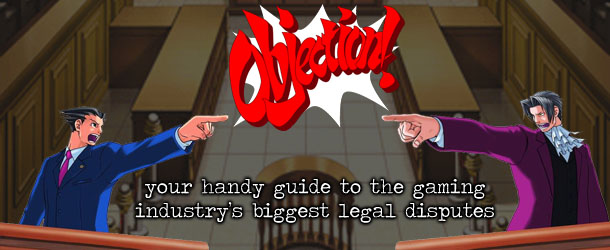
The videogame industry's a big business -- and sometimes, companies don't see eye-to-eye. And what happens when a dispute goes to court, and gamers get their grubby hands on fancy-sounding legal documents? Why, wild, inane, forum-fueled speculation, of course. That's where California-based corporate attorney and GameSpy freelancer Eric Neigher comes in. Objection! is your one-stop destination to learn what all that legalese means in plain English, straight from someone who knows the twisty-turny language of the law.
Intro
If you're like me, you probably went to high school with one or two dudes who went into the guts of their consoles with a soldering iron so that they could play games from outside the U.S., and then were all smug about how awesome their favorite porno game from Italy was, or something. Also, if you're like me, you probably wonder why it is that some people get in the left-hand lane and then wait until the frickin' light turns green to put on their turn signal, thus completely screwing you and everyone else in the left-hand lane over. What the hell is those guys' problem? But I digress.
My point is, modding, chipping, jailbreaking, or otherwise customizing your console to get rid of the restrictions placed on it by covetous manufacturers has always been fairly commonplace among the hardcore set, and it's also always been more-or-less accepted to one degree or another. Sure, game companies have never openly endorsed it, but they've never aggressively pursued it legally -- mostly because of the negative cost-benefit that such a pursuit would entail, and because it was neither widespread nor damaging enough for them to really be concerned.

Enter the modern era, where consoles themselves are sold at a big loss so that companies can recoup profits on the games, where piracy (thanks to the vast proliferation of high-speed Internet) is rampant, and where companies jealously guard their intellectual property and territorial exclusivity. These days, it's both more technically difficult to mod a console than it used to be, and much more actively forbidden by the game companies. This appears to be especially true of Sony, who recently applied for and received a temporary restraining order (TRO) against one George Hotz, who hacked the security codes blocking his PlayStation 3 from playing anything but factory-approved games, and then published how he did it on the Internet.
Does Sony's successful TRO bid signal an end to the salad days of modding your console to do whatever you want? Will this TRO lead to a stifling of free speech for Mr. Hotz and others like him? How many (and what kinds of) rights does a console manufacturer have when it comes to telling people what they can do with and say about their lawfully purchased consoles?
Facts
So, first of all, what exactly happened here? Well, it seems Mr. Hotz -- a New Jersey resident -- cracked his PS3 by breaking the encryption that prevents the system from playing unsigned software (such as pre-release builds and/or pirated versions of games), and then he, and a group of about 100 other dudes, disseminated the information on how to obtain and use the codes on various message boards. Sony alleges that this action, apart from infringing on terms of use for their consoles, amounts to an intentional circumvention of their security measures to protect their copyrighted works (as well as "trafficking" in circumvention techniques) -- that is, hacking.

Additionally, Sony alleges a violation of the Digital Millennium Copyright Act (DMCA, everybody's favorite law!), the Computer Fraud and Abuse Act (a Federal anti-hacking and anti-cracking law), and some California state and common-law copyright laws, too. On top of all this, Sony is accusing Hotz and the other 100 "hackers" of breach of contract (the terms of use for their PS3 that they clickwrap-agreed to), of tortious interference with contract by influencing other gamers to violate their agreements to the PS3 terms of use, and of trespassing and misappropriation.
Whew! That's a veritable smorgasbord of lawsuit deliciousness right there. Some of this stuff we've seen before, like tortious interference (Objection! #8) and breach of contract (Objection! #1), but some of it, especially the "circumvention" stuff and the trespassing charge, are probably new to you. Ordinarily, I'd go into details on these in the Analysis section below... but they're not super-relevant to the issue here, and are mostly afterthoughts to the lawsuit anyway, and will probably get dismissed in court. So, I'm going to leave them out and move on to what Sony's really pissed-off about (if you'd like to get a breakdown of what these really mean, leave a comment and I'll respond).
See, the big issue here isn't so much that Hotz and his guys breached the terms of service, but that they figured out a way to potentially make piracy a hell of a lot easier... and then blabbed about it. Sony is concerned -- and let's be honest, they're right to be -- about people using the knowledge of their security measures to play stolen games, rather than buying games from official sources. Proliferation of such behavior would, obviously, be ruinous to Sony's business, as they make just about all of their money on game sales and actually lose money (to one degree or another, depending on who is doing the calculations) on the sale of the consoles themselves. This is also true of Microsoft with regard to the Xbox 360, by the way, although not with Nintendo and the Wii or DS.
Knowing all that, let's get into the meat of this thing.


